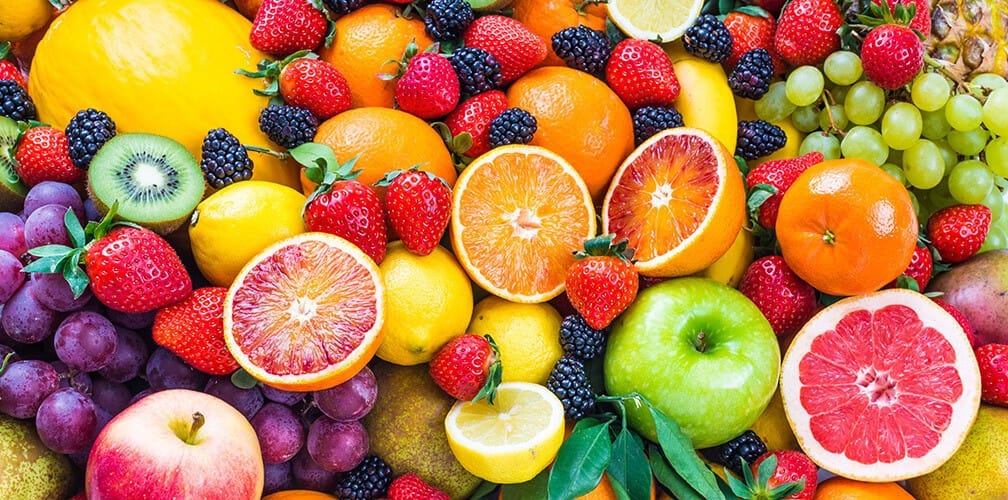The great debate continues – is fructose bad for you?
Over the last few years we have seen a lot of media coverage and publications on this very question.
Some say that fructose is the sole root cause of our obesity problems, while others say it is no worse than any other nutrient.
Let’s break down what fructose actually is, the issues it may cause and what the current research and reviews suggest.
Before digging in, as a valued reader of the blog, I’d like to extend you an invitation to our upcoming and totally FREE online training workshop:
‘The Proven Nutrition Strategies of Elite Trainers’.
This workshop is for you if you want to finally learn the best nutrition protocols and evidenced-based strategies to help your clients achieve life-changing results.
This workshop is our most complete training on how to make nutrition coaching easy and profitable.
All you need to do to attend is click here to register your free spot.

What is Fructose
Fructose is a type of sugar and is also known as a fruit sugar formed from simple carbohydrates known as monosaccharides.
In terms of its chemical structure it is exactly the same as glucose, another popular sugar, however fructose is the sweetest tasting of all sugars.
Many people associate fructose with fruit, yet it is largely consumed in today’s society via a number of processed foods that we now eat.
Aside from the sweetness aspect of this sugar, its popularity mainly came about for economic reasons. Fructose has only recently been an addition to our foods (aside from natural products), so here’s a short history lesson.
1957: Two scientists called Richard Marshall and Earl Kooi discovered ‘Aeromonas hydrophilia’, a bacterium that turns corn kernels into fructose. At this time cane sugar was heavily used for sweetening products.
1970’s: It wasn’t until a large spike in cane sugar prices occurred in the 70’s when manufacturers decided to look for alternatives to cane sugar. This is when they discovered that corn prices were dirt-cheap and the process created by Marshall & Kooi could turn it into fructose.
Since then food manufacturers haven’t looked back, and we are now surrounded by foods containing fructose from high fructose corn syrup (HFCS) and sucrose (table sugar), which is a disaccharide made up of glucose and fructose.
2000’s: It wasn’t until the early 2000’s when two nutrition scientists called Barry Popkin and George Bray published a scientific nutrition paper in the American Journal of Clinical Nutrition that highlighted a link between the increasing use of HFCS (fructose) and the rising American obesity problem. (1)
Is Fructose Bad For You
This research, along with others began to highlight some negative health aspects from consuming this relatively new substance.
Here’s a quick breakdown of the common issues raised:
Obesity
Fructose is metabolized by the liver, thus bypassing the muscle cells, our main storage compartment for glucose. Our livers can only hold so much glucose before it is saturated and passes the surplus fructose onto storage (as it is not needed), into our fat cells.
Therefore, if we eat more than we burn off, it will then be stored in fat cells for later use. (2) (3)
Insulin Resistance
As already mentioned, as fructose is metabolized in the liver, it does not cause the pancreas to release insulin the way it normally would in relation to carbohydrate consumption.
Insulin is the key hormone responsible for shuttling carbohydrates to the body’s cells. As fructose does not trigger the hormone, it can remain in the blood. This creates a condition called hyperinsulinemia, meaning too much insulin in the blood stream.
The result can be an insulin resistant liver which means its production of glucose becomes deregulated, thus it does not switch off its production of glucose when you eat carbs.
This forces the body to release even more insulin (even without the presence of carbs) as the liver continues to produce glucose, causing us to also become insulin resistant at the pancreas.
This commonly leads to hypoglycemia, which is a key feature of the metabolic syndrome, a cluster of symptoms believed to cause type II diabetes, obesity and heart disease. (4)
Triglyceride Rise
The research also showed that fructose can raise serum triglyceride (TC) levels due to an over production in the liver. Elevated TC’s have been linked to cardio vascular diseases. (5)
Leptin & Gherlin Links
Leptin is a hormone responsible for signaling to the body that we have had enough food – we are full. Gherlin is another hormone that acts as the opposite to leptin – it signals when we are hungry.
It has been shown that fructose does not cause any responses to these hormones, meaning it is very easy to over eat. (6)
There is also research to suggest that fructose may increase blood pressure, reduce HDL (good cholesterol levels) and increase fatty acid deposits in the liver. (7)
Does The Evidence Hold Up?
It appears fructose can cause us a few problems, but were we too quick to point the finger and solely blame this sugar for all of our problems? Perhaps so.
There are a couple of glaring issues with some of the existing data and research:
Correlation does not mean causation
Data trends from the 1970’s shows not only an increase in fructose consumption but also in overall daily caloric intake – from flour products and fats (oils and dairy). It is therefore difficult to pin point one food as the main problem, which we appear to be doing in this instance.
Furthermore, since 2000 fructose consumption has decreased (possibly due to the research on and the popularity of low carb diets) yet we still see an average daily 500 caloric increase since the 70’s.
This shows that fructose may not be the key player in making us eat more.
Animal research
Much of the research was conducted on animals, not humans. There appears to be a significant difference between how a rat and a human responds to fructose, mainly due to the fact that fructose does not behave any differently in humans than any other carb source.
Fructose is not eaten on its own
Many of the main health issues associated with fructose are based on the consumption of this sugar alone, with no other foods present. This clearly isn’t the case in our day to day eating habits.
The Benefits and How Much Fructose Per day
If you are eating whole unprocessed foods that naturally contain fructose then you shouldn’t be worried about any health issues with fructose.
Fructose can be found in many fruits (and veggies), which not only taste good but also contains a host of vitamins, minerals, antioxidants, fibre and polyphenols.
Therefore eliminating some of these foods because they contain some fructose would be stupid – the benefits far outweigh the negatives.
The body does just fine at handling modest amounts of fructose too, and the typical guideline is around 15-25 grams per day. (8)
Many common fruits do not surpass single figure amounts of fructose, meaning a number of pieces of fruit per day can be consumed within those guidelines.
Avoiding a diet high in processed and refined carbohydrates will ensure you stay well within the recommended guidelines, and it all comes down to one thing – balance.
Become an elite-level nutrition coach
My team and I have just finished up creating a brand new online training workshop called 'The Proven Nutrition Strategies of Elite Trainers.'
Best part? It costs you nothing. This is your official invite - all you need to do to attend is click here to register.
This free nutrition course is for you if you want to finally learn the best nutrition protocols and evidenced-based strategies to help your clients achieve life-changing results.
Join me and I’ll walk you through the exact steps you need to take in order to get incredible client results, boost your confidence and build your business with proven nutrition coaching strategies.

